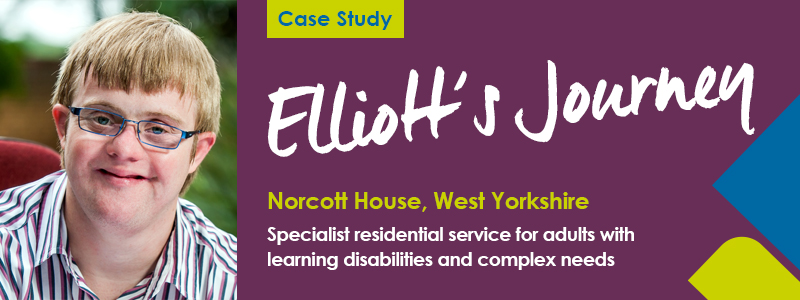
Elliott’s history
Elliott was born with Down’s Syndrome, a learning disability and autism. He grew up with other siblings that had complex needs and has utilised the support of care services for most of his adult life. Although his family supported him as much as they were able to, in order for him to get the dedicated care he needed, he was referred to a residential service.
When he came to us
Elliott was referred to Norcott House as an emergency placement. There were concerns about the care he was receiving at his previous service and so he needed a quick transfer to a safe environment. The Norcott House team visited Elliott on the day the referral was received and arranged for him to move in within 48 hours.
Elliott came to Norcott House anxious and withdrawn, after some negative experiences he was distrusting of staff. He spent a lot of time alone in his room and didn’t wish to participate in any activities. The previous service had been utilising PRN medication to manage Elliott’s anxiety.
Elliott’s care
Although the quick transfer was necessary, it was understandably unsettling for Elliott. The team at Norcott House gave him time and space to settle into his new surroundings. With a low staff turnover at the home, Elliott was able to see the same faces from day to day, giving him a sense of consistency, and the team soon got to know him.
Staff also worked closely with Elliott’s family to improve their understanding of his needs. The family shared how they had to stop home visits, due to Elliot becoming upset at the thought of returning to his previous service. This was a key goal for the team, to be able to restore quality family time.
When the time was right, staff were able to spend lots of time chatting with Elliott to understand his interests and any concerns. It was very important to build a trusting relationship with him. It was with time, genuine care and compassion that Elliott started to come out of his shell.
With Elliott feeling safe and happy, staff were able to offer him lots of opportunities for meaningful activities. He began to attend the textiles, education and bakery projects on offer to Cygnet’s residential services in Yorkshire.
Through building a good understanding of Elliott, the team were able to adapt their communication style – making simple tasks fun or silly and speaking in a playful tone was something he really responded to. They recognised the signs of him feeling overwhelmed, and which activities could help him unwind; colouring in for example.
Initially, it was recommended that Elliott accessed the community with 2:1 support, but following several successful trips with staff, they were quickly able to review this and reduce it to 1:1 support. Although Elliott does feel anxious at times, the team have never needed to utilise PRN medication, and find that communication and his calming activities are enough to deescalate any stressful moments for him.
Elliott today
Today, Elliott is happy and full of confidence, he can often be heard having cheeky banter with the team and enjoys his weekly role supporting maintenance with their health and safety checklist. He regularly attends the bakery and education project, as well as getting involved with activities provided in-house.
Elliott’s family are very happy to have visits at their home again, knowing that when it’s time to leave he will happily head back to Norcot House. They are especially pleased with the progress of Elliott’s speech, mentioning how far he has come. The team put this down to days spent chatting away!
“His life has changed round for the better. His speech has come along and his understanding is a lot better. His behaviour has improved massively and this is linked with the home itself and how he’s being treated. Because of the staff and how they handle things, it’s made a big difference to his life.”Family Member
*Name has been changed to protect his identity